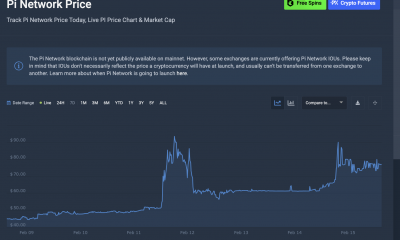

others
Japanese Yen retreats after hitting over two-month high against USD – Crypto News
- The Japanese Yen climbs to an over two-month top against USD amid BoJ rate hike bets.
- Retreating JGB yields cap the JPY and assists USD/JPY to bounce off sub-149.00 levels.
- The emergence of fresh USD selling should keep a lid on a further recovery for the pair.
The Japanese Yen (JPY) builds on last week’s strong gains against its American counterpart and drags the USD/JPY pair below the 149.00 mark, or the lowest level since early December during the Asian session on Monday. Japan’s strong Consumer Price Index (CPI) released on Friday comes on top of the upbeat Q4 Gross Domestic Product (GDP) growth report last week. This, along with expectations that sustained wage gains would spur consumer spending, suggests that the Bank of Japan (BoJ) might hike interest rates more aggressively than initially thought and continue to underpin the JPY.
Apart from this, the emergence of fresh US Dollar (USD) selling benefits the JPY and contributes to the USD/JPY pair’s slide for the fourth straight day – marking the seventh day of a negative move in the previous eight. Meanwhile, BoJ Governor Kazuo Ueda showed readiness to ramp up government bond buying if long-term interest rates rise sharply. This, in turn, leads to a further pullback in the Japanese government bond (JGB) yields, from a multi-year peak touched last week, which prompts some intraday JPY selling and assists the currency pair in rebounding over 50 pips from the daily low.
Japanese Yen bulls retain control amid hawkish BoJ expectations
- Data released on Friday showed that Japan’s core inflation touched a 19-month high in January and reinforced expectations that the Bank of Japan will keep raising interest rates.
- BoJ Governor Kazuo Ueda warned on Friday that the central bank could increase bond buying if abnormal market moves trigger a sharp rise in the government bond yields.
- The yield on the benchmark Japanese government bond (JGB) retreats further from its highest level since November 2009 set last week and caps gains for the Japanese Yen.
- A disappointing sales forecast from Walmart raised doubts about US consumer health and drags the US Dollar to over a two-month low during the Asian session on Monday.
- The flash S&P Global US Composite PMI dropped to 50.4 in February, from 52.7 in January, pointing to a weaker expansion in overall business activity across the private sector.
- Separately, the University of Michigan reported that its US Consumer Sentiment Index dropped more than expected, from 71.7 previous to 64.7 in February, or a 15-month low.
- Moreover, households saw inflation over the next year surging to 4.3% — the highest since November 2023 — and running at 3.5% — the highest since 1995 – over the next five years.
- Federal Reserve officials remain wary of future interest rate cuts amid sticky inflation and the uncertainty over US President Donald Trump’s tariff plans and protectionist policies.
USD/JPY seems vulnerable while below 151.00-150.90 support breakpoint
From a technical perspective, any subsequent move up is likely to confront stiff resistance near the 150.00 psychological mark. Some follow-through buying could lift the USD/JPY pair to last Friday’s swing high, around the 150.70-150.75 region, en route to the 150.90-151.00 horizontal support breakpoint. The latter should act as a key pivotal point, which if cleared decisively might trigger a short-covering rally and lift spot prices beyond the 151.40 intermediate hurdle, towards the 152.00 mark. The momentum, however, runs the risk of fizzling out rather quickly near the 152.65 area, representing the very important 200-day Simple Moving Average (SMA).
On the flip side, the 149.00 mark, followed by the Asian session low around the 148.85 region, now seems to act as an immediate hurdle ahead of the 148.65 area, or the December 2024 trough. Failure to defend the said support levels would make the USD/JPY pair vulnerable to accelerate the fall further toward the 148.00 round figure. The downward trajectory could extend further towards the next relevant support near the 147.45 region before spot prices eventually drop to the 147.00 mark.
Japanese Yen FAQs
The Japanese Yen (JPY) is one of the world’s most traded currencies. Its value is broadly determined by the performance of the Japanese economy, but more specifically by the Bank of Japan’s policy, the differential between Japanese and US bond yields, or risk sentiment among traders, among other factors.
One of the Bank of Japan’s mandates is currency control, so its moves are key for the Yen. The BoJ has directly intervened in currency markets sometimes, generally to lower the value of the Yen, although it refrains from doing it often due to political concerns of its main trading partners. The BoJ ultra-loose monetary policy between 2013 and 2024 caused the Yen to depreciate against its main currency peers due to an increasing policy divergence between the Bank of Japan and other main central banks. More recently, the gradually unwinding of this ultra-loose policy has given some support to the Yen.
Over the last decade, the BoJ’s stance of sticking to ultra-loose monetary policy has led to a widening policy divergence with other central banks, particularly with the US Federal Reserve. This supported a widening of the differential between the 10-year US and Japanese bonds, which favored the US Dollar against the Japanese Yen. The BoJ decision in 2024 to gradually abandon the ultra-loose policy, coupled with interest-rate cuts in other major central banks, is narrowing this differential.
The Japanese Yen is often seen as a safe-haven investment. This means that in times of market stress, investors are more likely to put their money in the Japanese currency due to its supposed reliability and stability. Turbulent times are likely to strengthen the Yen’s value against other currencies seen as more risky to invest in.
-

 Cryptocurrency4 days ago
Cryptocurrency4 days agoSUI eyes 24% rally as bullish price action gains strength – Crypto News
-

 others6 days ago
others6 days agoJapanese Yen remains depressed amid modest USD strength; downside seems limited – Crypto News
-

 Technology1 week ago
Technology1 week agoMacBook Air M3 15-inch model gets a ₹12,000 price drop on Amazon: Deal explained – Crypto News
-

 Cryptocurrency3 days ago
Cryptocurrency3 days agoCoinbase scores major win as SEC set to drop lawsuit – Crypto News
-

 Technology1 week ago
Technology1 week agoPerplexity takes on ChatGPT and Gemini with new Deep Research AI that completes most tasks in under 3 minutes – Crypto News
-

 Technology1 week ago
Technology1 week agoLava Pro Watch X with 1.44-inch AMOLED display, in-built GPS launched in India at ₹4,499 – Crypto News
-

 Technology1 week ago
Technology1 week agoMassive price drops on Samsung Galaxy devices: Up to ₹10000 discount on Watch Ultra, Tab S10 Plus, and more – Crypto News
-

 Blockchain1 week ago
Blockchain1 week agoPopular Investor Says Memecoin More Superior With ‘World’s Best Chart’ – Crypto News
-

 Blockchain1 week ago
Blockchain1 week agoXRP To 3 Digits? The ‘Signs’ That Could Confirm It, Basketball Analyst Says – Crypto News
-

 others1 week ago
others1 week agoAustralian Dollar jumps to highs since December on USD weakness – Crypto News
-

 Cryptocurrency1 week ago
Cryptocurrency1 week agoWho is Satoshi Nakamoto, The Creator of Bitcoin? – Crypto News
-

 Business7 days ago
Business7 days agoWhat Will be KAITO Price At Launch? – Crypto News
-

 Business6 days ago
Business6 days agoElon Musk’s DOGE Launches Probe into US SEC, Ripple Lawsuit To End? – Crypto News
-

 Blockchain6 days ago
Blockchain6 days agoXRP Set To Outshine Gold? Analyst Predicts 1,000% Surge – Crypto News
-

 Blockchain6 days ago
Blockchain6 days agoXRP Price Pulls Back From Highs—Are Bulls Still in Control? – Crypto News
-

 Technology3 days ago
Technology3 days agoStellantis Debuts System to Handle ‘Routine Driving Tasks’ – Crypto News
-

 Cryptocurrency1 week ago
Cryptocurrency1 week agoYap-to-earn takes over Twitter – Blockworks – Crypto News
-

 Cryptocurrency1 week ago
Cryptocurrency1 week ago0xLoky Introduces AI-powered Intel for Crypto Data & On-chain Insights – Crypto News
-

 Technology1 week ago
Technology1 week agoFactbox-China’s AI firms take spotlight with deals, low-cost models – Crypto News
-

 Cryptocurrency1 week ago
Cryptocurrency1 week agoTether Acquires a Minority Stake in Italian Football Giant Juventus – Crypto News
-

 Cryptocurrency1 week ago
Cryptocurrency1 week agoCrypto narratives as we await next market move – Crypto News
-

 Business1 week ago
Business1 week agoHow Will It Affect Pi Coin Price? – Crypto News
-

 Technology1 week ago
Technology1 week agoWeekly Tech Recap: JioHotstar launched, Sam Altman vs Elon Musk feud intensifies, Perplexity takes on ChatGPT and more – Crypto News
-

 Cryptocurrency1 week ago
Cryptocurrency1 week agoGameStop Stock Price Pumps After Report of Bitcoin Buying Plans – Crypto News
-

 Technology1 week ago
Technology1 week agoWhat will it take for India to become a global data centre hub? – Crypto News
-

 Technology1 week ago
Technology1 week agoChatGPT vs Perplexity: Sam Altman praises Aravind Srinivas’ Deep Research AI; ‘Proud of you’ – Crypto News
-

 Blockchain1 week ago
Blockchain1 week agoNEAR Breaks Below Parallel Channel: Key Levels To Watch – Crypto News
-

 Blockchain1 week ago
Blockchain1 week agoWill BTC Rebound Or Drop To $76,000? – Crypto News
-

 Blockchain1 week ago
Blockchain1 week agoXRP Price Settles After Gains—Is a Fresh Upside Move Coming? – Crypto News
-

 Metaverse7 days ago
Metaverse7 days agoHow AI will divide the best from the rest – Crypto News
-

 Cryptocurrency6 days ago
Cryptocurrency6 days agoHayden Davis crypto scandal deepens as LIBRA memecoin faces fraud allegations – Crypto News
-

 Technology6 days ago
Technology6 days agoLuminious inverters for your home to never see darkness again – Crypto News
-

 Business6 days ago
Business6 days agoWhales Move From Shiba Inu to FXGuys – Here’s Why – Crypto News
-

 Cryptocurrency1 week ago
Cryptocurrency1 week agoSomeone Just Won $100K in Bitcoin From a $50 Pack of Trading Cards – Crypto News
-

 Technology1 week ago
Technology1 week agoCyber fraud alert: Doctor duped of ₹15.50 lakh via fake trading app; here’s what happened – Crypto News
-

 Technology1 week ago
Technology1 week agoOpenAI board unanimously rejects Musk’s $97.4 billion takeover bid: ‘Not for sale’ – Crypto News
-

 Blockchain1 week ago
Blockchain1 week agoIs BTC Heading For $150K Rally? – Crypto News
-

 Technology1 week ago
Technology1 week agoGrok 3 is coming! Elon Musk announces launch date, promises ‘smartest AI on Earth’ – Crypto News
-

 Technology1 week ago
Technology1 week agoUnion Minister Ashwini Vaishnaw to launch India AI Mission portal soon, 10 companies set to provide 14,000 GPUs – Crypto News
-

 Business7 days ago
Business7 days agoThese 3 Altcoins Will Help You Capitalize on Stellar’s Recent DIp – Crypto News
-

 others6 days ago
others6 days agoForex Today: What if the RBA…? – Crypto News
-

 Technology1 week ago
Technology1 week agoSay goodbye to tangled cables: Stylish magnetic power banks keep your iPhone or Android charged on the go – Crypto News
-

 Technology1 week ago
Technology1 week agoBest gaming mobiles under ₹20,000 in February 2025: Poco X6 Pro, OnePlus Nord CE 4 Lite and more – Crypto News
-

 Blockchain1 week ago
Blockchain1 week agoXRP Bullish Pennant Targets $15-$17 But Confirmation Is Required – Crypto News
-

 Technology1 week ago
Technology1 week agoSouth Korea removes DeepSeek from app stores, existing users advised to ‘service with caution’ – Crypto News
-

 Blockchain1 week ago
Blockchain1 week agoBitcoin Price Falls Short Again—Is a Deeper Decline Coming? – Crypto News
-

 others7 days ago
others7 days agoWTI price bullish, according to FXStreet data – Crypto News
-

 Business7 days ago
Business7 days agoWhy Ethereum (ETH) Price Revival Could Start Soon After Solana Mess? – Crypto News
-

 Business7 days ago
Business7 days agoMarket Veteran Predicts XRP Price If Ripple Completes Cup and Handle Pattern – Crypto News
-

 others6 days ago
others6 days agoUS Dollar struggles to gather traction on quiet Monday – Crypto News














